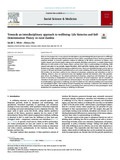| dc.contributor.author | White, Sarah C. | |
| dc.date.accessioned | 2021-02-24T11:55:59Z | |
| dc.date.available | 2021-02-24T11:55:59Z | |
| dc.date.issued | 2018 | |
| dc.identifier.citation | Sarah C. White, Shreya Jha, Towards an interdisciplinary approach to wellbeing: Life histories and Self-Determination Theory in rural Zambia, Social Science & Medicine, Volume 212, 2018,
Pages 153-160, ISSN 0277-9536, https://doi.org/10.1016/j.socscimed.2018.07.026 | |
| dc.identifier.uri | https://opendocs.ids.ac.uk/opendocs/handle/20.500.12413/16382 | |
| dc.description.abstract | What are the prospects for a cross-cultural, interdisciplinary and methodologically plural approach to wellbeing? This question is addressed using Self-Determination Theory (SDT), a psychological theory based on quantitative empirical methods, to structure qualitative analysis of wellbeing in life history interviews in Chiawa, rural Zambia. Enquiry goes beyond simply reading across methods, disciplines and contexts, to consider fundamental differences in constructions of the human subject, and how these relate to understandings of wellbeing. Field research took place in two periods, August–November, 2010 and 2012. Analysis draws primarily on 46 individual case studies, conducted through open-ended interviews. These were identified through a survey with an average of 390 male and female household heads in each round, including 25% female headed households. As SDT predicts, the interviews confirm its key elements of autonomy, competence and relatedness as vital to wellbeing. However, these are expressed in ways that highlight material and relational, rather than psychological, factors. Key findings are: the mutual constitution of autonomy, competence and relatedness; the appreciation of autonomy as independence in action; the importance of social competence; and the centrality of relatedness. People appear as social and above all moral subjects. The paper concludes by endorsing SDT's utility in interdisciplinary approaches to wellbeing, but only if it admits its own cultural grounding in the construction of a psychological subject. This would go beyond recognising that autonomy, competence and relatedness may take socially and culturally distinctive forms, to questioning their universal status as basic psychological needs. Implications for organisations working on wellbeing are discussed. | |
| dc.publisher | Elsevier Ltd | |
| dc.rights.uri | https://creativecommons.org/licenses/by/4.0/ | |
| dc.title | Towards an Interdisciplinary Approach to Wellbeing: Life Histories and Self-Determination Theory in Rural Zambia | |
| dc.type | Article | |
| dc.rights.holder | © 2018 The Authors. Published by Elsevier Ltd | |
| dc.identifier.externaluri | https://doi.org/10.1016/j.socscimed.2018.07.026 | |
| dc.identifier.ag | ES/H033769/1 | |
| dc.identifier.doi | 10.1016/j.socscimed.2018.07.026 | |


